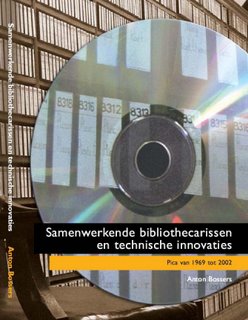 I am deep into online history of the Netherlands at present. It is exciting. And you discover publications by accident. This morning I hit on a pdf publication on the Dutch library system. When I translate the title from Dutch into English, it would read Collaborating Librarian and Technical Innovations. The pdf tells the history of the Dutch library system PICA over the years 1969 till 2002. The pdf has been written by Anton Bossers, who served PICA for 25 years and left the company in 2002.
I am deep into online history of the Netherlands at present. It is exciting. And you discover publications by accident. This morning I hit on a pdf publication on the Dutch library system. When I translate the title from Dutch into English, it would read Collaborating Librarian and Technical Innovations. The pdf tells the history of the Dutch library system PICA over the years 1969 till 2002. The pdf has been written by Anton Bossers, who served PICA for 25 years and left the company in 2002.Bossers goes back till the sixties, when the Weinberg report Science, government, and information: the responsibilities of the technical community and the government in the transfer of information (1963) was published. This US report has impact in the Netherlands and in 1968 a Dutch action report is published. The Dutch academic libraries as well as the Dutch Royal Library agree that they should computerise the library resources in order to make a virtual national library register, accessible in every academic library.
At that moment the name of Pierre Vinken shows up. Most people will know Pierre Vinken as the CEO of Reed Elsevier. But in the sixties he was the content guru of the Netherlands. As a surgeon he had gotten involved in hospital computing systems. As he was also the editor-in-chief and managing director of the Excerpta Medica Foundation, which published abstract magazine, he had a DEC-minicomputer installed for editorial assistance, for registering links and photo-typesetting. He was consulted by other publishing companies and of course by the library community.
Due to a lot of bickering among the academic libraries, it took the Dutch library community more than 10 years before is started producing registers for the academic libraries. (I still remember that I was in the Amsterdam University library and that the librarian told me that they were databasing the library entries from the past years; the students would only look into the computer for titles , but would not go to card register to have a look.) And after the academic libraries they got involved in other educational establishments and public libraries. PICA now has a complete database of books available in all Dutch libraries.
In the nineties PICA started to look across the borders, first into Germany and after that in France. There they met the American company OCLC. They had met several times before and had made deals, especially about copying American databases. But in France they met as competitors. This was an experience for PICA, as it was not exactly a commercial operation. In 2002 OCLC concluded the acquisition of the Dutch library system.
Tags: libraries

No comments:
Post a Comment